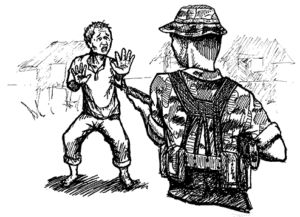Correspondence Dolefil workers' bitter Christmas


The Dole brand is known for its expensive fresh and canned fruit products. They go into favorite dishes during Christmas and special occasions. The multinational company earns billions of dollars annually from fresh fruit sales in the local and export market. This profit came from the land taken away from farmers and from the hard work and sacrifices of thousands of Filipino workers paid with low wages and deprived of decent living. For them, Christmas and New Year are bitter days.
Dole’s monopoly
Dole is considered one of the largest exporters of fruit products worldwide. It earned $6.5 billion in 2021. Its biggest operation is in South Cotabato which began six decades ago. The company’s continuous growth is the result of oppressive and exploitative land grabbing and extracting superprofits from its thousands of workers.
According to 2020 data, Dolefil employed 20,000 workers in Polomolok, South Cotabato, or 52% of Dole Plc’s 38,500 workers worldwide. Only about 7,000 are regularly employed by the company. In recent years, the company continually lays off regular workers on the pretext of “losses” from its operations. However, this is contradicted by the fact that it continuous to employ contractuals.
Exploitation and enslavement of workers
Some workers have been working for the company for 10 years but are still not regular. This is because they are under a labor cooperative contracted by Dolefil. They are only paid ₱340.00 per day—8% less than the already low wages of regular workers who receive a minimum (₱368 per day in Socsksargen).
Dolefil partners with cooperatives in recruiting and managing contractual and seasonal workers. Through this, the company systematically avoids obligations to pay proper wages, provide benefits and recognize the right to from unions.
Other than contractuals, the company employs pickers and relievers who are “employed” by cooperatives. They receive the lowest wage among all workers. They only work for three or four days. They are under the “quota” system and the cooperative cuts a portion of their wage. They usually get only ₱700 every pay day.
Workers cannot complain because they lack job security. Some of their complaints include non-remittance of their contributions to SSS, PhilHealth and Pag-ibig, and occupational hazards. Harvesters are also forced to work even under the rain to reach the high quota. They are exposed to toxic chemicals.
Christmas inflation and crisis
Even before receiving their 13th month pay and bonus last Christmas, workers have already spent it in their minds. One of them is contractual worker Boyet. He planned to use a part for school expenses and school supplies. Another part will go to paying debts. He also planned to prepare a delicious meal for his children for noche buena, which comes only once a year.
But due to high prices, Boyet and his fellow company workers’ wages and bonuses were not enough. To supplement their household expenses, one of his co-worker sold the canned goods given by the company, though strictly prohibited.
To ensure their noche buena meal, they bought meat on credit that will be paid for on the next payday. This adds to their debts which have been piling up the entire year due to their meager salaries. Often, they are forced to pawn their ATM card and rice bonuses to Polomolok usurers to keep up with very high cost of living.









